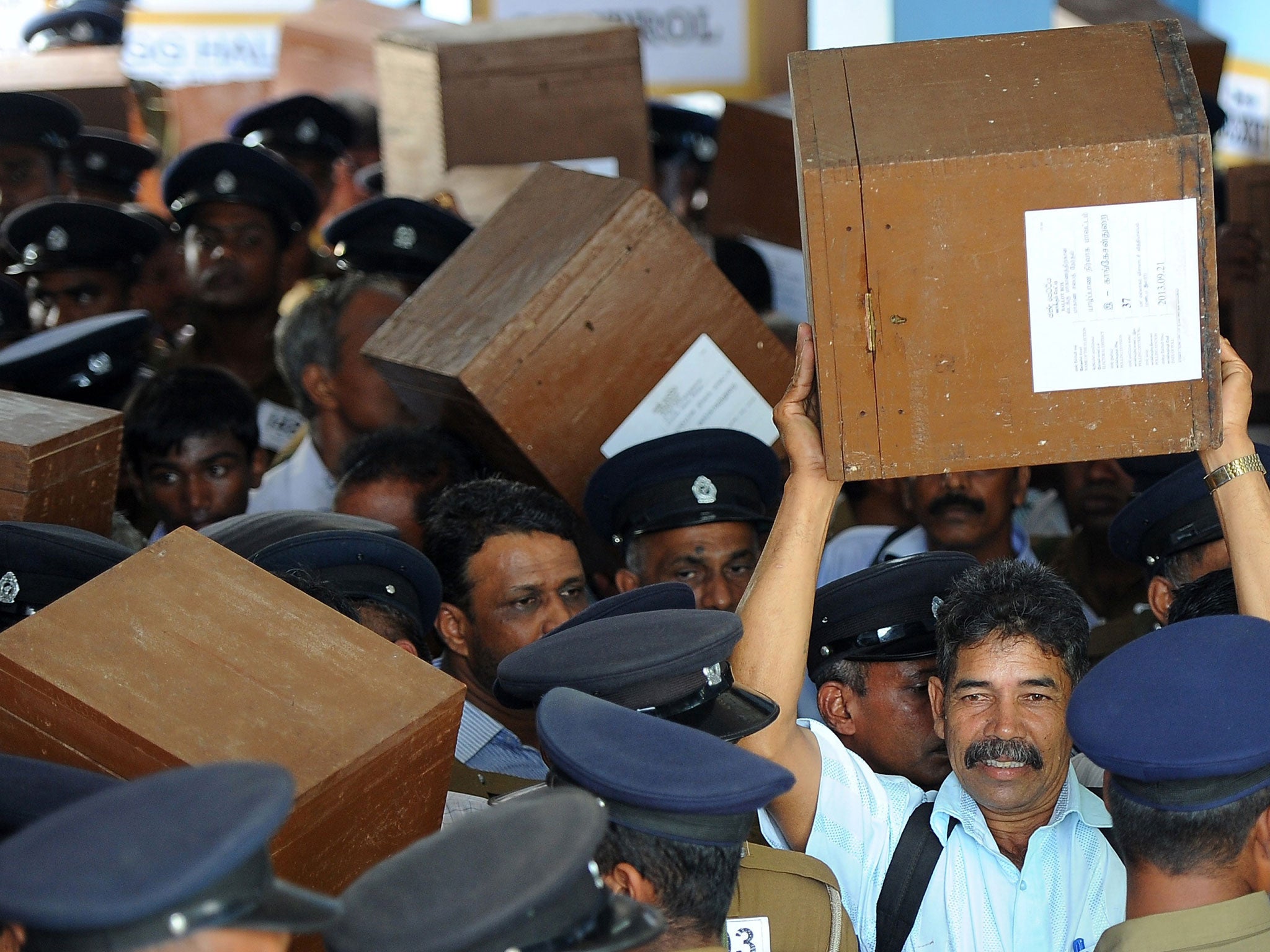Sri Lanka's Tamil community finally get provincial council vote

Your support helps us to tell the story
From reproductive rights to climate change to Big Tech, The Independent is on the ground when the story is developing. Whether it's investigating the financials of Elon Musk's pro-Trump PAC or producing our latest documentary, 'The A Word', which shines a light on the American women fighting for reproductive rights, we know how important it is to parse out the facts from the messaging.
At such a critical moment in US history, we need reporters on the ground. Your donation allows us to keep sending journalists to speak to both sides of the story.
The Independent is trusted by Americans across the entire political spectrum. And unlike many other quality news outlets, we choose not to lock Americans out of our reporting and analysis with paywalls. We believe quality journalism should be available to everyone, paid for by those who can afford it.
Your support makes all the difference.Every day Raja Padmanabhan, a 63-year-old bachelor living in a quiet area of Jaffna, hopes someone will hire his services. He has his own van and often drives doctors from the Jaffna hospital or – on longer trips – visitors from the Sri Lankan Tamil diaspora who want to see the former battlegrounds of the north or the calmer sites of Kandy or Sigiriya further south.
But Jaffna has always been his home. Tomorrow, for the first time ever, Raja and the other people of the Tamil-dominated Northern Province will vote for a functioning provincial council. “I’ll vote for the Tamil National Alliance (TNA). It’s the only choice,” he says. “If the TNA wins, the international community will take action on the Tamil problem.”
The TNA wants greater self-determination for the north and the adjoining east. It was once seen as a proxy for the Tamil Tiger militants, who ruled or held sway over much of the north for decades before their crushing defeat by the army in 2009. The Tigers wanted a separate state but the TNA now accepts a united island although it wants a federal one.
That, however, is anathema to the government of the Sinhalese nationalist President, Mahinda Rajapaksa. It is finally allowing the Northern election – long postponed by war – to take place but it exerts, and openly preaches the need for, highly centralised rule.
Jaffna, for decades ruled or infiltrated by the Tamil Tigers and ravaged by war, is now a quiet city, still recovering. New shops and businesses spring up along its freshly tarred streets. Vintage Morris Minors pass by, while there is now a smattering of Western backpackers to be seen.
But many back streets are potholed and lined by ruined buildings, testimony to the war that was fought over this very issue of Tamils’ demand for devolution. That issue remains stubbornly unresolved. Attempts to address it over the decades either foundered or were shelved.
A determined and sometimes bitter election campaign has been waged over the past few weeks – both in Jaffna and in the Vanni, the Northern “mainland”, where the Tigers forced hundreds of thousands of people to accompany them in fleeing the advancing army. Those people were then subjected to months of horrifying bombardments as the army went all-out to flatten the rebels.
The government side is telling people in no uncertain terms not to vote for the TNA. Pro-government posters have sprung up in Jaffna picturing a gun with the slogan: “Are you voting for the TNA? Are you ready to go back to war?” And state television has aired broadcasts falsely announcing that votes in favour of the TNA would be invalid as the TNA’s manifesto faces legal challenges from Sinhala nationalist groups.
It has been violent, too. Earlier today dozens of armed men in army uniform stormed the home of a TNA candidate, Ananthi Sasitharan, saying they wanted to kill her. She fled but several others including an election monitor were injured. Ms Sasitharan blamed the government and the security forces. They denied involvement.
The two main contending groupings – the Government and the TNA – have indulged in bitter rhetoric. Justice C V Wigneswaran, a former Supreme Court judge picked as the TNA’s candidate for chief minister in the north, blamed the army for attacking Ms Sasitharan – whose husband was a senior Tiger leader who disappeared after surrendering to the government in 2009. He accused the Sinhalese-dominated military of keeping people in fear through its heavy local presence.
But the government’s lead candidate in Jaffna, also a Tamil, Sinnadurai Thavarajah, told The Independent that the allegations of an overbearing army were untrue. “These are false allegations, false propaganda given by the [Tamil] diaspora community,” he said. He described the TNA’s bid for self-determination as “irrelevant”. Many local Tamils disagree.
Join our commenting forum
Join thought-provoking conversations, follow other Independent readers and see their replies
Comments